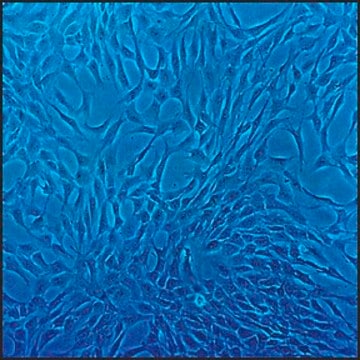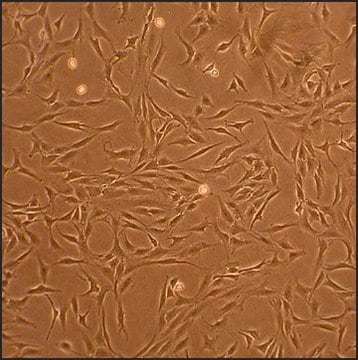SCC042
TC28a2 Human Chondrocyte Cell Line
Human
Synonym(s):
T/C-28a2
About This Item
Recommended Products
product name
TC28a2 Human Chondrocyte Cell Line, TC28a2 Human Chondrocyte Cell Line is widely used as a model cell line for studying normal and pathological cartilage repair mechanisms related to chondrocyte biology and physiology.
biological source
human
Quality Level
technique(s)
cell culture | mammalian: suitable
shipped in
ambient
General description
T/C-28a2 cell line was established by transfecting primary cultures (day 5) of costal cartilage from a 15-year-old female with a retroviral vector expressing simian virus SV40 large T antigen.
References:
1. Goldring, M.B, Birkhead, J.R., Suen, L.F., Yamin, R., Mizuno, S., Glowacki, J., Arbiser, J.L, Apperley, J.F. (1994) Interleukin-1 beta-modulated gene expression in immortalized human chondrocytes. J. Clin. Invest 94(6): 2307-2316.
2. Claassen, H., Schicht, M., Brandt, J., Reuse, K., Schadlich, R., Goldring, M.B., Guddat, S.S., Thate, A., Paulsen, F. C-28/I2 and T/C-28a2 chondrocytes as well as human primary articular chondrocytes express hormone and insulin receptors- Useful cells in study of cartilage metabolism Ann Anat. 193(1): 23-29.
3. Goldring, M.B. (2004) Culture of immortalized chondrocytes and their use as models of chondrocyte function. Methods Mol. Med. 100: 37-52.
Cell Line Description
Application
Quality
• Cells are tested by PCR and are negative for HPV-16, HPV-18, Hepatitis A, B, C and HIV-1 & 2 viruses.
• Cells are negative for mycoplasma contamination.
• Each lot of cells are genotyped by STR analysis to verify the unique identity of the cell line.
Storage and Stability
Other Notes
Disclaimer
Storage Class Code
10 - Combustible liquids
WGK
WGK 3
Flash Point(F)
Not applicable
Flash Point(C)
Not applicable
Certificates of Analysis (COA)
Search for Certificates of Analysis (COA) by entering the products Lot/Batch Number. Lot and Batch Numbers can be found on a product’s label following the words ‘Lot’ or ‘Batch’.
Already Own This Product?
Find documentation for the products that you have recently purchased in the Document Library.
Our team of scientists has experience in all areas of research including Life Science, Material Science, Chemical Synthesis, Chromatography, Analytical and many others.
Contact Technical Service







